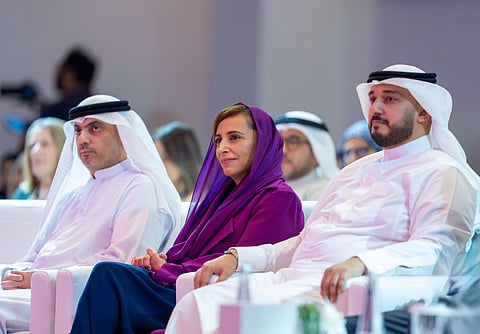Bodour Al Qasimi inaugurates 2nd Early Childhood Literacy Conference in Sharjah
Event to examine strategies to promote Arabic literacy in early childhood education

Sheikha Bodour bint Sultan Al Qasimi, Founder and CEO of Kalimat Group, inaugurated on Thursday the second edition of the Early Childhood Literacy Conference in Sharjah. Organised by Kalimat Group in partnership with the National Academy for Childhood Development and sponsored by National Paints LLC, the event runs from October 10 to 12 at the Higher Education and Scientific Research Council.
As the first conference of its kind in the Arab world, it marks a major milestone in advancing early childhood education. Bringing together leading experts from around the world, the 2-day event explores innovative ways to integrate songs, stories, play, arts, and technology into Arabic language learning. The programme presents comprehensive, research-based approaches to teaching Arabic in early years, examines the growing role of artificial intelligence and digital tools in supporting literacy and language development, and highlights how children’s literature and folktales shape identity and nurture a lifelong love of reading.
In her keynote address, Sheikha Bodour Al Qasimi said: “Sharjah’s vision, guided by His Highness Sheikh Dr. Sultan bin Mohammed Al Qasimi, Member of the Supreme Council and Ruler of Sharjah, sets language at the heart of identity. Teaching Arabic in early childhood is about fostering communication and a sense of belonging. Through this conference, we are building modern, creative ways to help children grow and develop, feeling confident in their language, culture and their future.”
Following the opening ceremony, Sheikha Bodour toured the various sections of the conference, including the “Border Crossings” exhibition - a Reggio Emilia-inspired exhibition created by Reggio Children in collaboration with the Reggio Emilia Istituzione of Municipal Preschools and Infant-Toddler Centres - on how children explore the relationship between the natural environment and digital media. She also toured the workshop area, where hands-on training and art sessions are led by international and local experts; the books corner featuring early childhood educational materials, and finally concluded her tour at the main stage, which is hosting panel discussions and presentations by leading academics and educators from around the world.
For her part, Dr. Meera Saeed AlKaabi, Chief of the National Academy for Childhood Development, said: “The Arabic language is the cornerstone of our national identity and strengthens cultural belongingness across generations. By partnering strategically with the Early Childhood Literacy Conference, we are creating a platform to share expertise and present the latest educational practices.” She added: “We support caregivers, educators and families through integrated learning programmes that focus on quality and deliver long-term impact in communities”
Samer Al Sayegh, Managing Director of National Paints LLC, said: “At National Paints, we believe preserving the Arabic language is key to protecting our identity and inspiring future generations. Together with Arabic education specialists and through the power of colour and imagination, we are exploring creative ways to keep children engaged, ensuring their love for the Arabic language continues to grow. Through creativity and colour, we can ensure Arabic is not only preserved, but cherished by the next generation.”
The opening day featured a panel discussion titled “UAE government achievements in promoting Arabic in early childhood,” which hosted Aisha Miran, Director General of the Knowledge and Human Development Authority in Dubai, Dr. Muhadditha Al Hashimi, Chairperson of the Sharjah Private Education Authority, and Salah Al Housani, Chairman of the Teachers Association – UAE.
Speakers in the session, moderated by Dr. Abdelsalam Alhammadi, Director of the Parliamentary Culture Office at the Federal National Council and a contributing presenter at Sharjah Broadcasting Authority, highlighted the UAE’s comprehensive national efforts to strengthen Arabic in early education, including curriculum reforms, teacher training programmes, and the introduction of nationwide policies and applied initiatives. The discussion underscored how these strategic measures have translated into tangible results, positioning Arabic as a central pillar of early learning across the nation.
During the opening ceremony, strategic and supporting partners were honoured, including the National Academy for Early Childhood Development - the strategic partner; National Paints - the official sponsor; the Sharjah Private Education Authority; the Sharjah Education Academy; the Higher Education and Scientific Research Council, and the international Reggio Children.
The conference underscores Kalimat Group’s enduring commitment to early childhood education as the cornerstone of language acquisition and cognitive growth. It reflects the Group’s ongoing pursuit of practical, evidence-based strategies to strengthen Arabic learning in the formative years and aligns with progressive educational policies that promote reading from early childhood. Through this platform, Kalimat showcases best practices designed to equip future generations with a strong foundation in literacy and a lifelong appreciation for the Arabic language.
The event features a robust programme of 16 panel sessions and 26 workshops led by 48 distinguished speakers, addressing more than 20 key themes. Topics span the science of reading in Arabic, the language’s influence on cognitive and physical development, evidence-based teaching methodologies, the integration of artificial intelligence and technology in Arabic instruction, visual learning as a pathway to literacy, and play-based language acquisition. Additional sessions explore the role of folktales, children’s literature, and early exposure in fostering literacy, as well as Arabic teaching approaches inspired by Montessori, Reggio Emilia, and Cambridge models. The programme is tailored for teachers and educators from across the emirates who seek to expand their expertise and enhance classroom practice.
Sign up for the Daily Briefing
Get the latest news and updates straight to your inbox







